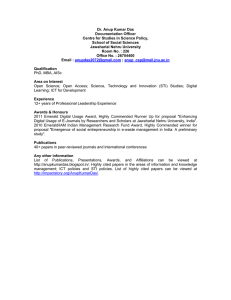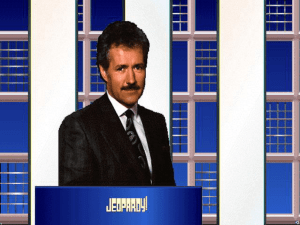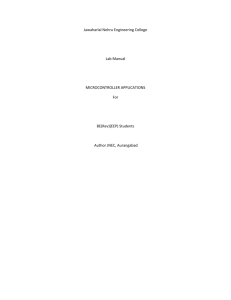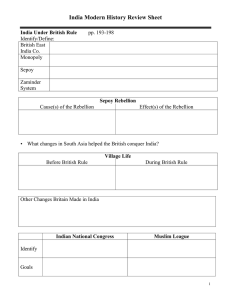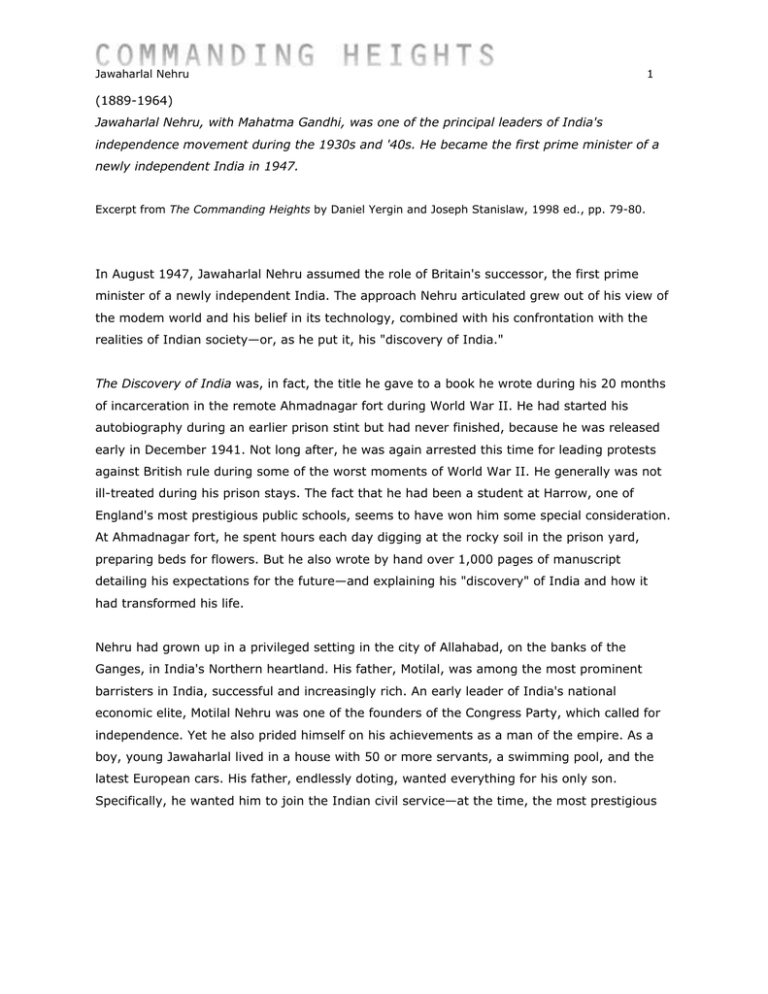
Jawaharlal Nehru
1
(1889-1964)
Jawaharlal Nehru, with Mahatma Gandhi, was one of the principal leaders of India's
independence movement during the 1930s and '40s. He became the first prime minister of a
newly independent India in 1947.
Excerpt from The Commanding Heights by Daniel Yergin and Joseph Stanislaw, 1998 ed., pp. 79-80.
In August 1947, Jawaharlal Nehru assumed the role of Britain's successor, the first prime
minister of a newly independent India. The approach Nehru articulated grew out of his view of
the modem world and his belief in its technology, combined with his confrontation with the
realities of Indian society—or, as he put it, his "discovery of India."
The Discovery of India was, in fact, the title he gave to a book he wrote during his 20 months
of incarceration in the remote Ahmadnagar fort during World War II. He had started his
autobiography during an earlier prison stint but had never finished, because he was released
early in December 1941. Not long after, he was again arrested this time for leading protests
against British rule during some of the worst moments of World War II. He generally was not
ill-treated during his prison stays. The fact that he had been a student at Harrow, one of
England's most prestigious public schools, seems to have won him some special consideration.
At Ahmadnagar fort, he spent hours each day digging at the rocky soil in the prison yard,
preparing beds for flowers. But he also wrote by hand over 1,000 pages of manuscript
detailing his expectations for the future—and explaining his "discovery" of India and how it
had transformed his life.
Nehru had grown up in a privileged setting in the city of Allahabad, on the banks of the
Ganges, in India's Northern heartland. His father, Motilal, was among the most prominent
barristers in India, successful and increasingly rich. An early leader of India's national
economic elite, Motilal Nehru was one of the founders of the Congress Party, which called for
independence. Yet he also prided himself on his achievements as a man of the empire. As a
boy, young Jawaharlal lived in a house with 50 or more servants, a swimming pool, and the
latest European cars. His father, endlessly doting, wanted everything for his only son.
Specifically, he wanted him to join the Indian civil service—at the time, the most prestigious
Jawaharlal Nehru
2
appointment an Indian could enjoy in the Empire. He sent the boy to Harrow (where he was
nicknamed Joe) and then to Cambridge, to Trinity College, where the young man studied
natural sciences with considerable indifference and amused himself in the social life along the
Backs, as the banks of the River Cam were called. He then studied to be a barrister in London,
spent rather lavishly, toured Europe, and wrote his father about actors and actresses he saw
in plays in different cities. He was deeply interested in technology. He followed with
fascination the development of aviation. He also had recurring dreams about flying effortlessly
in the sky.
In 1912, Nehru returned home to Allahabad, where for eight years he practiced law without
much enthusiasm. His lifestyle bordered on the opulent. He worked as a lawyer, went to
parties, and read Punch on Sundays. But he itched for something more. As a boy he had been
stirred by stories of the Indian mutiny of 1857-58. He had also devoured histories about
Giuseppe Garibaldi and other nationalists, and dreamed of "greatness." Moreover, he would
write, "I was always, like my father, a bit of a gambler, at first with money and then for
highest stakes, with the bigger issues of life." By this time, Mahatma Gandhi had begun his
long journeys on foot through the country's villages, gathering followers and breathing a new
urgency into the Congress Party's independence movement. Emotionally compelled, Nehru
grew close to the mahatma, and became engaged in the cause. Even in his own privileged life,
he saw that Empire and British rule were a humiliation. The senior officials of the British Raj
would come to his father's house and drink his champagne, but they would never invite his
father back to their own houses for dinner.
In 1919, the British Army massacred protesters in the city of Amritsar. Enraged, Nehru was
raised out of his lethargy and stirred to action. He joined in an independent inquiry that the
Congress Party established. But for Nehru, the decisive event came the next year, in 1920. His
family had escaped the stifling heat of Allahabad for the elegant Savoy Hotel in the hill station
of Mussoorie, leaving him to follow. A delegation of Afghani Muslims was in the same hotel.
The British authorities, fearful of Hindu-Muslim collaboration, forbade Nehru to meet them.
Rather than be ordered around by the British, he decided to stay at home in Allahabad. At the
same time, a group of peasants, protesting against exorbitant taxes and mass evictions,
arrived from the hinterland district of Rae Bareli in hopes of finding Gandhi in the city. But he
Jawaharlal Nehru
3
was elsewhere. So instead, they headed for the Nehru family compound. And there they asked
Nehru to go in Gandhi's stead, to lead a new inquiry. Nehru, with little else to do, agreed.
What followed would overwhelm him. The peasants built roads overnight so that his car could
pass deep into rural India; they rallied together again and again to lift his car when it became
stuck in mud. Nehru had never seen anything like the wretched poverty he now encountered.
"After all," biographer M. J. Akbar would write, "he was still an Indian sahib in a hat and silk
underwear." But under the scorching and blinding sun, Nehru was transformed. "I was filled
with shame and sorrow," he later wrote, ''shame at my own easygoing and comfortable life
and our petty politics of the city, which ignored this vast multitude of semi-naked sons and
daughters of India, sorrow at the degradation and overwhelming poverty of India." He had
also discovered his political vocation—and the focus for his ambition. To his father, with whom
he corresponded candidly, he wrote: "Greatness is being thrust on me." He moved to the fore
in the independence movement and emerged as Gandhi's designated heir. Joe, the publicschool boy at Harrow, had become Pandit—Teacher—and the leader with Gandhi of the
Congress Party.
If independence was the central political issue, then fighting poverty was the central economic
issue. With independence achieved in August 1947, poverty was the problem. Whereas Gandhi
and Nehru were united on political objectives, they were divided on economics. For Gandhi,
the model was swadeshi, self-reliance—simple home production of basic goods, self-sufficiency
in the village, and a spinning wheel in every hut. Why should colonial India export cotton to
Manchester, only to import it back in the form of expensive clothing? Indians should make
their own clothes. Gandhi had little time for socialism and class warfare. After independence,
he lectured a group of Communists: "What to me is even more pathetic is that you regard
Russia as your spiritual home. Despising Indian culture, you dream of planting the Russian
system here." Nehru's view disagreed fundamentally with Gandhi's. He sought a different kind
of self-sufficiency—industrialization and the steel mill. His central objective was "to get rid of
the appalling poverty of the people." He believed in technology and progress, in machines and
industrialization—"I'm all for tractors and big machinery," he said—and he intended to use
20th-century means to achieve his goal.
Jawaharlal Nehru
4
Lenin had said that "communism equals Soviet power plus electrification. " Nehru offered a
variant in his formula for India's development—"heavy engineering and machine-making
industry, scientific research institutes, and electric power." He certainly shared in the Attlee
consensus. His adoption of the themes and ideas of the Labor Party was evident in his
recurrent evocation of the commanding heights, the mixed economy, and the need for
planning. But he was also much impressed with the Soviet model, and embraced five-year
plans and central planning. While troubled by what communism did to freedom, he wrote
during his last term in prison that "the Soviet Revolution had advanced human society by a
great leap and had lit a bright flame which could not be smothered and that it laid the
foundation for a new civilization toward which the world could advance." Private property, yes,
but it was to be subordinate to the state in the building of the Indian economy.
Their sharply differing economic visions put Gandhi and Nehru very much at odds. In 1945,
Gandhi accused his appointed heir of being unfaithful to his economic vision of swadeshi and
an India composed of harmonious villages. "I do not understand why a village should
necessarily embody truth and nonviolence," Nehru shot back. "A village, normally speaking, is
backward intellectually and culturally and no progress can be made from a backward
environment. Narrow-minded people are much more likely to be untruthful and violent." The
master's vision, said Nehru, was "completely unreal."
|
A Hindu extremist murdered Gandhi on January 30, 1948. The country was thrown into shock
and pervasive grief. Nehru had lost his spiritual father. But now there was also nothing left to
stop his economic program, which he pursued as prime minister until his death in 1964. Under
Nehru, India embarked on a socialist course that had already been laid out in the late 1930s in
the Congress Party's National Planning Committee—chaired by Nehru. He had then divided the
world between two groups of people. There were those "who want to advance the world
further and free the people from the chains of imperialism and capitalism. On the other side,
there are a handful of people who are deriving benefit from the present state of things." India,
he concluded, would take its stand on "independence and socialism"; for, he added that was
what was needed, "in our own poverty-stricken country, where unemployment prevails."
Copyright © 1998 by Daniel A. Yergin and Joseph Stanislaw. Reprinted by permission of Simon &
Schuster, Inc., N.Y. All rights reserved.

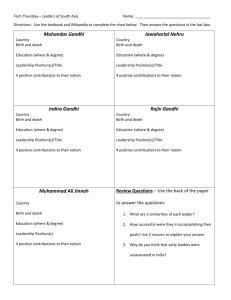
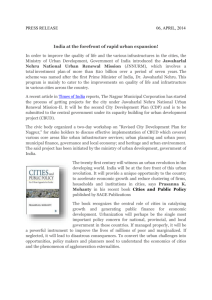
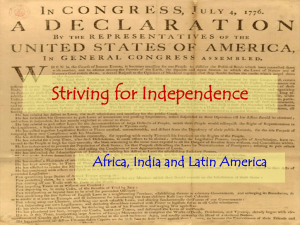
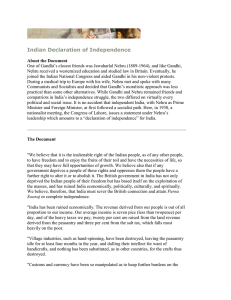
![South Asia [India]](http://s3.studylib.net/store/data/009702364_1-19e39c605abd17ea47a31ad7fcd12c7d-300x300.png)
